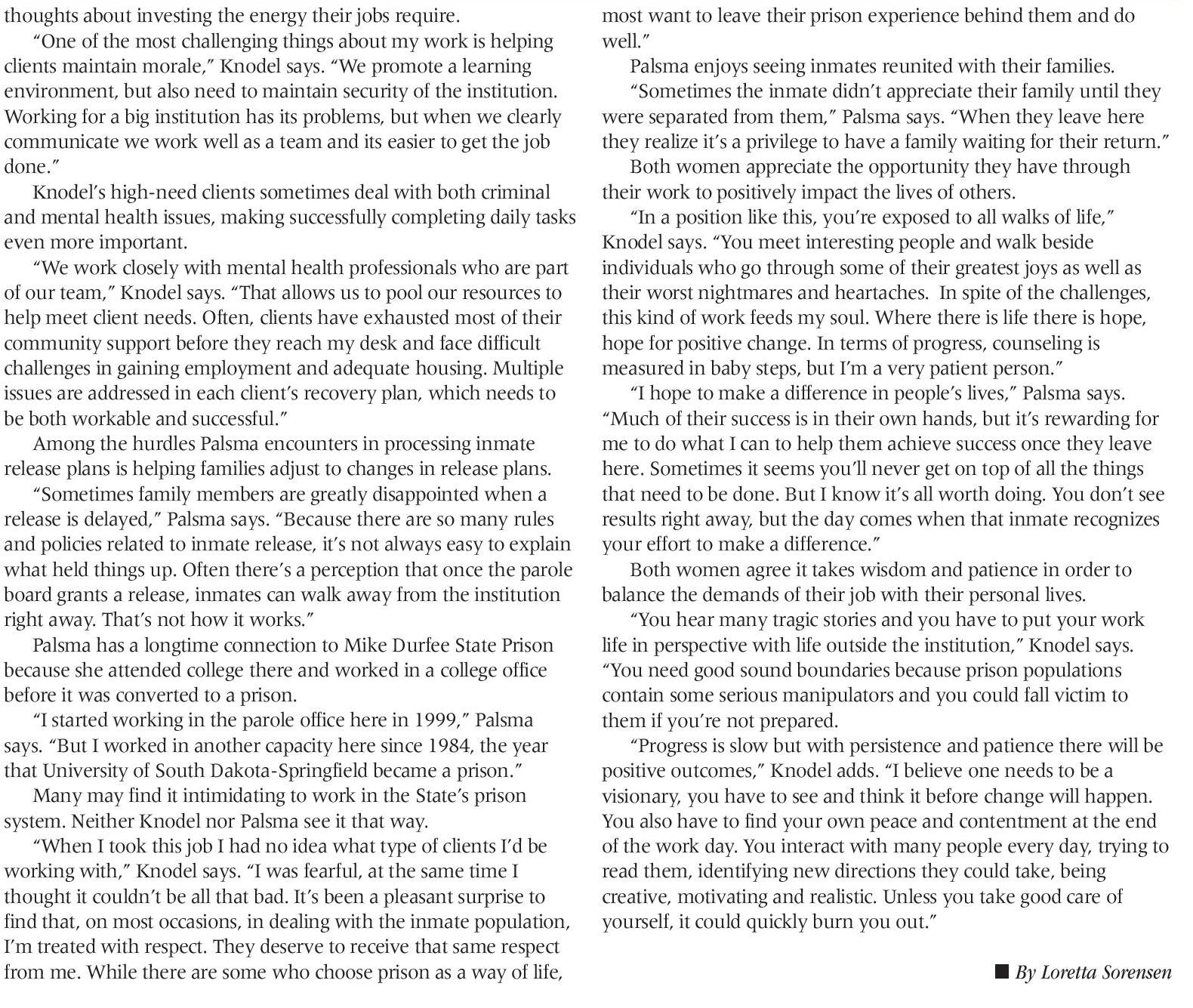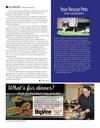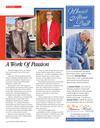21


thoughts about investing the energy their jobs require.
“One of the most challenging things about my work is helping
clients maintain morale,” Knodel says. “We promote a learning
environment, but also need to maintain security of the institution.
Working for a big institution has its problems, but when we clearly
communicate we work well as a team and its easier to get the job
done.”
Knodel’s high-need clients sometimes deal with both criminal
and mental health issues, making successfully completing daily tasks
even more important.
“We work closely with mental health professionals who are part
of our team,” Knodel says. “That allows us to pool our resources to
help meet client needs. Often, clients have exhausted most of their
community support before they reach my desk and face difficult
challenges in gaining employment and adequate housing. Multiple
issues are addressed in each client’s recovery plan, which needs to
be both workable and successful.”
Among the hurdles Palsma encounters in processing inmate
release plans is helping families adjust to changes in release plans.
“Sometimes family members are greatly disappointed when a
release is delayed,” Palsma says. “Because there are so many rules
and policies related to inmate release, it’s not always easy to explain
what held things up. Often there’s a perception that once the parole
board grants a release, inmates can walk away from the institution
right away. That’s not how it works.”
Palsma has a longtime connection to Mike Durfee State Prison
because she attended college there and worked in a college office
before it was converted to a prison.
“I started working in the parole office here in 1999,” Palsma
says. “But I worked in another capacity here since 1984, the year
that University of South Dakota-Springfield became a prison.”
Many may find it intimidating to work in the State’s prison
system. Neither Knodel nor Palsma see it that way.
“When I took this job I had no idea what type of clients I’d be
working with,” Knodel says. “I was fearful, at the same time I
thought it couldn’t be all that bad. It’s been a pleasant surprise to
find that, on most occasions, in dealing with the inmate population,
I’m treated with respect. They deserve to receive that same respect
from me. While there are some who choose prison as a way of life,
most want to leave their prison experience behind them and do
well.”
Palsma enjoys seeing inmates reunited with their families.
“Sometimes the inmate didn’t appreciate their family until they
were separated from them,” Palsma says. “When they leave here
they realize it’s a privilege to have a family waiting for their return.”
Both women appreciate the opportunity they have through
their work to positively impact the lives of others.
“In a position like this, you’re exposed to all walks of life,”
Knodel says. “You meet interesting people and walk beside
individuals who go through some of their greatest joys as well as
their worst nightmares and heartaches. In spite of the challenges,
this kind of work feeds my soul. Where there is life there is hope,
hope for positive change. In terms of progress, counseling is
measured in baby steps, but I’m a very patient person.”
“I hope to make a difference in people’s lives,” Palsma says.
“Much of their success is in their own hands, but it’s rewarding for
me to do what I can to help them achieve success once they leave
here. Sometimes it seems you’ll never get on top of all the things
that need to be done. But I know it’s all worth doing. You don’t see
results right away, but the day comes when that inmate recognizes
your effort to make a difference.”
Both women agree it takes wisdom and patience in order to
balance the demands of their job with their personal lives.
“You hear many tragic stories and you have to put your work
life in perspective with life outside the institution,” Knodel says.
“You need good sound boundaries because prison populations
contain some serious manipulators and you could fall victim to
them if you’re not prepared.
“Progress is slow but with persistence and patience there will be
positive outcomes,” Knodel adds. “I believe one needs to be a
visionary, you have to see and think it before change will happen.
You also have to find your own peace and contentment at the end
of the work day. You interact with many people every day, trying to
read them, identifying new directions they could take, being
creative, motivating and realistic. Unless you take good care of
yourself, it could quickly burn you out.”
n By Loretta Sorensen
Let our design
professionals
help you acquire Your Purchase
the look and feel with FREE In-Home
you desire from Design Consultation
accessories to Yankton Slumberland only.
Some restrictions apply.
furniture See store for details.
20% Off
slumberland
920 Broadway, Yankton, SD • 605-665-3719 M-F 9-8 Sat. 9-6, Sun Noon-5
furniture that lives the way you do
HERVOICE MARCH/APRIL 2014 v 21


























 Previous Page
Previous Page

